- Home
- Jonathan Stroud
The Golem's Eye Page 4
The Golem's Eye Read online
Page 4
But if they failed, what next? Each week, new Resistance crimes took place. Magicians’ houses were burgled, cars robbed, shops and offices attacked. The pattern was obvious enough: opportunistic crimes, carried out by small, fast-moving units who somehow managed to stay clear of patrolling vigilance spheres and other demons. All very well. But still no breakthrough came.
Nathaniel knew that Mr. Tallow’s patience was running out. Little teasing comments, such as those from Clive Jenkins and Jane Farrar, suggested that other people knew this, too. He tapped his pencil on his notepad, his thoughts drifting to the three members of the Resistance he had seen. Fred and Stanley … the memory of them made him grind his teeth and tap the pencil ever harder. He would catch them one day, see if he didn’t. And there was the girl, too. Kitty. Dark-haired, fierce, a face glimpsed in the shadows. The leader of the trio. Were they in London still? Or had they fled somewhere far off, to lurk beyond the reaches of the law? All he needed was a clue, a single measly clue. Then he’d pounce on them, faster than thought.
But he had nothing whatsoever to go on.
“Who are you?” he said to himself. “Where are you hiding?”
His pencil broke in his hand.
3
It was a night ripe for enchantment. A huge full moon, resplendent with the tinctures of apricots and wheat, and surrounded by a pulsing halo, held sovereignty over the desert sky. A few wispy clouds fled before its majestic face, leaving the heavens naked, glistening blue-black, like the belly of some cosmic whale. In the distance, the moonlight lapped the dunes; down in the secret valley, the golden haze penetrated the contours of the cliffs to bathe the sandstone floor.
But the wadi was deep and narrow, and to one side an outcrop of rock sheathed an area in inky darkness. In this sheltered place a small fire had been lit. The flames were red and meager; they cast little light. A starveling trail of smoke rose up from the fire and drifted away into the cold night air.
At the edge of the well of moonlight, a figure sat cross-legged before the fire. A man, muscular and bald, with glistening, oiled skin. A heavy gold ring hung from his ear; his face was blank, impassive. He stirred; from a pouch looped around his waist, he took a bottle, fixed with a metal stopper. With a series of languid movements that nevertheless suggested the feral, easy strength of a desert lion, he uncorked the bottle and drank. Tossing it aside, he stared into the flames.
After a few moments, an odd scent extended out across the valley, accompanied by distant zither music. The man’s head nodded, drooped. Now only the whites of his eyes showed; he slept where he sat. The music grew louder; it seemed to come from the bowels of the earth.
Out from the darkness someone stepped, past the fire, past the sleeper, into the lit ground at the center of the valley. The music swelled; the very moonlight seemed to brighten in homage to her beauty. A slave girl: young, exquisite, too poor to afford adequate clothing. Her hair hung in long, dark ringlets that bounced with every tripping step. Her face was pale and smooth as porcelain, her eyes wide and studded with tears. At first tentatively, then with a sudden loosening of emotion, she danced. Her body dipped and spun, her flimsy drape struggled vainly to keep up with her. Her slender arms wove enticements in the air, while from her mouth issued a strange chanting, heavy with loneliness and desire.
The girl finished her dance. She tossed her head in proud despair and gazed up into the darkness, toward the moon. The music died away. Silence.
Then, a distant voice, as if borne on the wind: “Amaryllis …”
The girl started; she looked this way and that. Nothing but the rocks and the sky and the amber moon. She gave a pretty sigh.
“My Amaryllis …”
In a husky, tremulous voice, she answered: “Sir Bertilak? Is that you?”
“It is I.”
“Where are you? Why do you taunt me so?”
“I hide behind the moon, my Amaryllis, lest your beauty burn my essence. Shield your face with the gauze that presently lies so uselessly upon your breast, that I might venture near to you.”
“Oh, Bertilak! With all my heart!” The girl did as she was bid. From the darkness came several low mutterings of approval. Somebody coughed.
“Darling Amaryllis! Stand away! I descend to earth.”
Giving a little gasp, the girl pressed her back against the contours of a nearby rock. She tossed her head in proud expectation. A crack of thunder sounded, fit to disturb the slumbers of the dead. Open-mouthed, the girl looked up. At a stately pace, a figure descended from the sky. He wore a silvered jerkin across his bare torso, a long flowing cape, puffed pantaloons, and a pair of elegant curled slippers. An impressive scimitar was tucked into his jeweled belt. Down he came, head back, dark eyes flashing, chin jutting forward proudly beneath his aquiline nose. A pair of curving bone-white horns rose from the edges of his forehead.
He landed gently near where the girl was draped against the rock and, with a casual flourish, flashed a gleaming smile. Faint female sighs sounded all around.
“What, Amaryllis—are you struck dumb? Do you forget so soon the face of your beloved genie?”
“No, Bertilak! Were it seventy years, not seven, I could never forget a single oiled hair upon your head. But my tongue falters and my heart pounds with fear, lest the magician wake and catch us! Then he will bind my slender white legs in chains once more, and immure you in his bottle!”
At this, the genie gave a booming laugh. “The magician sleeps. My magic is greater than his, and ever shall be. But the night is growing old, and by dawn I must be away with my brothers, the afrits, riding on the currents of the air. Come to my arms, my darling. In these short hours, while I still have human form, let the moon be witness to our love, which shall defy the hatred of our peoples even unto the ending of the world.”
“Oh, Bertilak!”
“Oh, Amaryllis, my Swan of Araby!”
The genie strode forward and enfolded the slave girl in a muscular embrace. At this point the ache in Kitty’s bottom became too much to bear. She shifted in her seat.
Genie and girl now began an intricate dance, involving much swirling of clothing and extending of limbs. There was a smattering of applause from the audience. The orchestra set to with renewed gusto. Kitty yawned like a cat, slumped lower and rubbed an eye with the palm of one hand. She felt for the paper bag, tipped out the last few salted peanuts and, cupping them to her mouth, crunched unenthusiastically.
The anticipation that always came before a job was upon her, digging like a knife into her side. That was normal, she expected it. But layered on top of this was the boredom of sitting through the endless play. No doubt, as Anne had said, it would provide a perfect alibi—but Kitty would rather have been working out her tension on the streets, keeping moving, dodging the patrols, not witnessing such awful pap.
On stage, Amaryllis, the Chiswick missionary lass turned slave girl, was now singing a song in which (once again) she expressed her unremitting passion for the genie lover in her arms. She did so with such force on the high notes that the hair rippled on Bertilak’s head and his earrings spun. Kitty winced and glanced along the shrouded silhouettes in front until she came to the outlines of Fred and Stanley. Both looked highly attentive, eyes trained on the stage. Kitty curled her lip. Presumably they were admiring Amaryllis.
Just so long as they remained alert.
Kitty’s gaze wandered down into the well of darkness by her side. At her feet was the leather bag. The sight made her stomach lurch; she closed her eyes, instinctively patting her coat to feel the reassuring hardness of the knife. Relax … all would be fine.
Would the interval never come? She raised her head and surveyed the dusky reaches of the auditorium, where, on either side of the stage, the magicians’ boxes hung, heavy with gold fretwork and thick red curtains to shield the occupants from the commoners’eyes. But every magician in town had seen this play years ago, long before it had opened to the sensation-hungry masses. Today the curtains were drawn
back, the boxes empty.
Kitty glanced at her wrist, but it was too dark to make out the time. Doubtless there were many forlorn partings, cruel ravishments, and joyful reunions left to endure before the interval. And the audience would love every minute of them. Like sheep, they thronged here night after night, year after year. Surely all of London had seen Swans of Araby by now, many people more than once. But still the buses puttered in from the provinces, bringing new customers to gasp at all the shabby glamour.
“Darling! Be silent!” Kitty nodded with approval. Nice one, Bertilak. He’d cut her off in the middle of her aria.
“What is it? What do you sense that I cannot?”
“Hist! Do not speak. We are in peril …” Bertilak rotated his noble profile. He looked high, he looked low. He seemed to sniff the air. All was still. The fire had burned right down; the magician slumbered; the moon had been obscured behind a cloud and cold stars twinkled in the sky. Not a sound came from the audience. To her great disgust, Kitty found she was holding-her breath.
Suddenly, with a ringing oath and a rasp of iron, the genie drew his scimitar and clutched the trembling girl to his chest. “Amaryllis! They come! I see them with my powers.”
“What, Bertilak? What do you see?”
“Seven savage imps, my darling, sent by the queen of the afrits to capture me! Our dalliance displeases her: they will bind us both and drag us naked before her throne to await her awful pleasure. You must flee! No—we have no time for soft words, though your limpid eyes implore me! Go!”
With many a tragic gesture, the girl disentangled herself from his arms and crept to the left of the stage. The genie tossed aside his cape and jerkin in bare-chested readiness for battle.
From the orchestral pit came a dramatic discord. Seven terrifying imps leaped out from behind the rocks. Each was played by a midget wearing a leather loincloth and a skin-coat of luminous green paint. With horrid whoops and grimaces, they drew stiletto daggers and fell upon the genie. A battle ensued, accompanied by a frenzy of screeching violins.
Vicious imps … a wicked magician … It was a subtle job, this Swans of Araby, Kitty could see that. Ideal propaganda, gently acknowledging popular anxieties rather than denying them flat out. Show us a little of what we fear, she thought, only take away its teeth. Add music, fight scenes, lashings of star-crossed love. Make the demons frighten us, then let us watch them die. We are in control. At the end of the show, all would no doubt be made well. The wicked sorcerer would be destroyed by the good magicians. The wicked afrits would be cast down, too. As for Bertilak, the rugged genie, doubtless he’d be a man after all, an eastern princeling transformed into a monster by some cruel enchantment. And he and Amaryllis would live happily ever after, watched over by the wise council of benevolent magicians….
A sudden sick feeling swelled in Kitty. It was not the tension of the job, this time; it came from deeper down, from the reservoir of fury that bubbled away perpetually inside. It was born of knowing that everything they did was utterly forlorn and useless. It would never change anything. The crowd’s response told her this. Watch! Amaryllis has been seized: an imp has her under his arm, kicking and weeping. Hear the crowd gasp! But see! Bertilak the heroic genie has tossed one imp over his shoulder into the smoldering fire! Now he pursues the captor and—one, two—makes short work of him with his scimitar. Hoorah! Hear the crowd cheer!
It didn’t matter what they did in the end; it didn’t matter what they stole, what daring attacks they made. It would make no difference. Tomorrow the queues would still be forming in the streets outside the Metropolitan, the spheres would still be watching from above, the magicians would still be elsewhere, enjoying the trappings of their power.
So it had always been. Nothing she had ever done had made any difference, right from the beginning.
4
The noise on the stage receded; in its place she heard birdsong, the hum of distant traffic. In her mind’s eye, the darkness of the theater was replaced by remembered light.
Three years ago. The park. The ball. Their laughter. Disaster on its way, like lightning from a blue sky.
Jakob grinning as he ran toward her; the bat’s weight, dry and wooden in her hand.
The strike! The triumph of it! Dancing with delight.
The distant crash.
How they ran, hearts thudding. And then—the creature on the bridge …
She rubbed her fingers into her eyes. But even that terrible day—was it truly the beginning? For the first thirteen years of her life, Kitty had remained unaware of the exact nature of the magicians’rule. Or perhaps she was not consciously aware of it, for looking back she realized that doubts and intuitions had managed to negotiate their way into her mind.
The magicians had long been at the zenith of their power and no one could remember a time when this wasn’t so. For the most part, they kept themselves removed from the experience of the ordinary commoner, remaining in the center of the city and in the suburbs, where broad, leafy boulevards idled between secretive villas. What lay between was left to everyone else, streets clogged with small shops, waste ground, the factories and brickworks. Magicians passed through occasionally in their great black cars, but otherwise their presence was mainly felt in the vigilance spheres floating randomly above the streets.
“The spheres keep us safe,” Kitty’s father told her one evening, after a large red orb had silently accompanied her home from school. “Don’t be frightened of them. If you’re a good girl, they’ll do you no harm. It’s only bad men, thieves and spies, who need to be afraid.” But Kitty had been frightened; after that, livid, glowing spheres often pursued her in her dreams.
Her parents were visited by no such fears. Neither of them was overly imaginative, but they were robustly conscious of the greatness of London and of their own small place in it. They took for granted the superiority of the magicians and fully accepted the unchanging nature of their rule. Indeed, they found it reassuring.
“I’d lay down my life for the Prime Minister,” her father used to say. “He’s a great man.”
“He keeps the Czechs where they belong,” her mother said. “Without him, we’d have the hussars marching down Clapham High Road, and you wouldn’t want that, dear, would you?”
Kitty supposed not.
They had lived, the three of them, in a terrace house in the south London suburb of Balham. It was a small home, with a sitting room and a kitchen downstairs and a tiny bathroom out back. Upstairs was a little landing and two bedrooms—Kitty’s parents’and her own. A long, thin mirror stood on the landing, before which, on weekday mornings, the whole family stood in turn, brushing hair and arranging their clothes. Her father in particular fiddled endlessly with his tie. Kitty could never understand why he kept on tying and untying it, kept on weaving the strip of fabric in, up, around and out, since the variations between each attempt were practically microscopic.
“Appearances are very important, Kitty,” he would say, surveying the umpteenth knot with furrowed brow. “In my job you’ve got only one chance to impress.”
Kitty’s father was a tall, wiry man, stubborn of outlook and blunt of speech. He was shop-floor manager in a large department store in central London and very proud of this responsibility. He supervised the Leathers section: a broad, low-ceilinged hall, dimly lit by orange lights and filled with expensive bags and briefcases made from cured animal skin. The leather goods were luxury items, which meant that the vast majority of customers were magicians.
Kitty had visited the shop once or twice, and the darkly overpowering smell of the processed leather always made her head spin.
“Stay out of the magicians’way,” her father said. “They’re very important people, and they don’t like anyone getting under their feet, even pretty little girls like you.”
“How do I know who’s a magician?” Kitty asked. She was seven at the time, and wasn’t sure.
“They’re always well dressed, their faces are stern and wise, a
nd sometimes they have fine walking sticks. They wear expensive scents, but sometimes you can still catch hints of their magic: strange incenses, odd chemicals…. But if you smell that, the chances are you’ll be too close! Stay out of their way.”
Kitty had promised faithfully. She scampered to far corners whenever customers entered the Leather hall and watched them with wide, curious eyes. Her father’s tips did not help much. Everyone visiting the store seemed well dressed, many carried sticks, and the stench of leather masked any unusual scents. But she soon began to pick out the magicians by other clues: a certain hardness in the visitors’eyes, their air of cool command and, above all, a sudden stiffening in her father’s manner. He always seemed awkward when talking with them, his suit newly wrinkled with anxiety, his tie nervously askew. He gave little bobs and bows of agreement as they spoke. These signs were very subtle, but they were enough for Kitty, and they disconcerted and even distressed her, though she hardly knew the reason why.
Kitty’s mother worked as a receptionist at Palmer’s Quill Bureau, a long-established firm hidden among the many bookbinders and parchment makers of South London. The Bureau provided special quill pens for the magicians to use in their conjurations. Quills were messy, slow, and difficult to write with, and fewer magicians than ever bothered to use them. The staff of Palmer’s used ballpoints instead.
The job allowed Kitty’s mother glimpses of the magicians themselves, since occasionally one would visit the Bureau to inspect a new consignment of pens. She found their proximity thrilling.
“She was so glamorous,” she would say. “Her clothes were the finest red-gold taffeta—I’m sure they came from Byzantium itself! And she was so imperious, too! When she snapped her fingers, everyone jumped like crickets to do her bidding.”

 The Leap
The Leap Buried Fire
Buried Fire Heroes of the Valley
Heroes of the Valley The Empty Grave
The Empty Grave The Hollow Boy
The Hollow Boy The Last Siege
The Last Siege The Dagger in the Desk
The Dagger in the Desk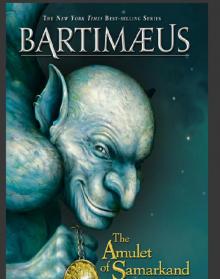 The Amulet of Samarkand
The Amulet of Samarkand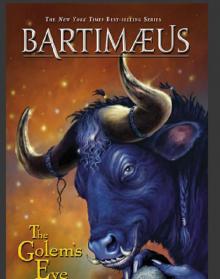 The Golem's Eye
The Golem's Eye The Screaming Staircase
The Screaming Staircase The Outlaws Scarlett and Browne
The Outlaws Scarlett and Browne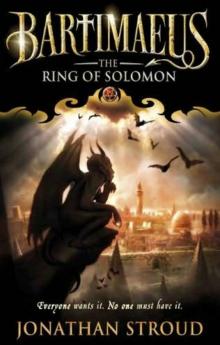 The Ring of Solomon: A Bartimaeus Novel
The Ring of Solomon: A Bartimaeus Novel Lockwood & Co
Lockwood & Co Lockwood & Co: The Screaming Staircase
Lockwood & Co: The Screaming Staircase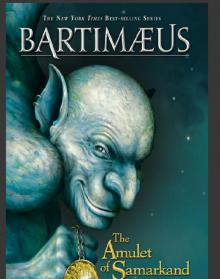 Bartimaeus: The Amulet of Samarkand
Bartimaeus: The Amulet of Samarkand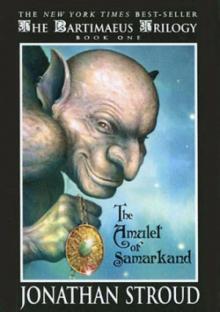 The Amulet of Samarkand tbt-1
The Amulet of Samarkand tbt-1 Lockwood & Co.: The Creeping Shadow
Lockwood & Co.: The Creeping Shadow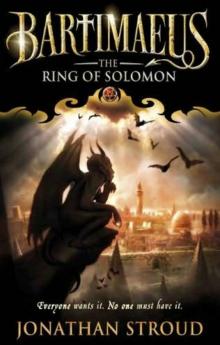 The Ring of Solomon
The Ring of Solomon Lockwood & Co. Book Three: The Hollow Boy
Lockwood & Co. Book Three: The Hollow Boy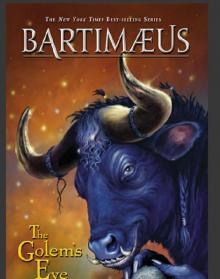 Bartimaeus: The Golem’s Eye
Bartimaeus: The Golem’s Eye